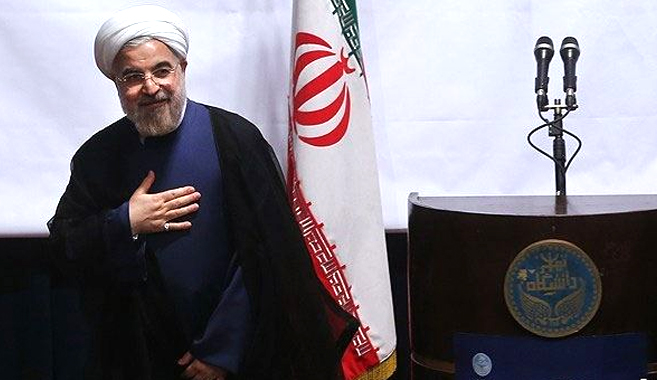
The proposal under consideration in Iran/US Geneva talks that ended on 9th Nov, was to have the first stage of a multipart agreement. It called for Iran to freeze its nuclear program for up to six months to allow negotiations on a long-term agreement without the worry that Iran was racing ahead to build a bomb. In exchange, the West was to have provided some easing of the international sanctions that have battered Iran’s economy.
Three days of high-level and high-stakes diplomacy came to an end in Geneva with no agreement on Iran’s nuclear program, after France blocked a stopgap deal aimed at defusing tensions and buying more time for negotiations. A six-nation group of major powers and Iran agreed only to meet again on 20 November, but on a lower level – senior diplomats rather than foreign ministers.
Iran’s president Hassan Rouhani said on Sunday that its “rights to enrichment” of uranium were “red lines” that would not be crossed and that the Islamic Republic had acted rationally and tactfully during the negotiations, according to Iranian media reports, quoted Reuters.
French opposition was focused on a draft text agreement that laid out a short-term deal to slow down or stop elements of the Iranian nuclear programme in return for limited sanctions relief. The French complained that the text, which they said was mostly drafted by Iran and the US, had been presented as a fait accompli and they did not want to be stampeded into agreement.
French representative, Fabius, being called Netanyahu’s man in Geneva, by the press, said one of the key issues was Iran’s heavy water reactor at Arak, which is due to reach completion next year after many delays. The west and Israel have called for construction work to stop as part of an interim deal aimed at buying time for negotiations on a more comprehensive long-term deal.
Iran says the reactor’s purpose is to produce nuclear isotopes that are useful for medical and agricultural purposes. But when operating it would produce plutonium as a by-product in its spent fuel, and that plutonium would represent a serious proliferation risk, giving an alternative route to making a bomb that would not depend on uranium enrichment. Israel has threatened to bomb the reactor before it starts operations, pointing out that once it is fuelled, bombing becomes impossible as it would scatter radioactive fallout around a large region.
Israel Started the Nuclear Arms Race in Middle East
Israel has never officially admitted to having nuclear weapons, instead repeating over the years that it would not be the first country to “introduce” nuclear weapons to the Middle East, but they did not act on the statement and started a nuclear arms race in which most Arab Nations would feel threatened.
The “not be the first” formulation goes back to the Eshkol-Comer memorandum of understanding made between Israel and the United States on the 10th March 1965, which contained Israel’s written assurance for the first time that it would not be the first to introduce nuclear weapons in the Middle East.
Israel has refused to sign the NPT despite international pressure to do so, and has stated that signing the NPT would be contrary to its national security interests. Estimates as to the size of the Israeli nuclear arsenal vary between 75 and 400 nuclear warheads.
Conclusion
It is only a matter of time before Iran would be capable of making a nuclear weapon. The threats of Israel do not seem to affect Iran, while Iran is portraying a very strong image in front of international media. The world powers are willing to recognized Iran’s capabilities and are demanding the process to be halted with fresh perspective, negotiating a midway.
Historically, peace talks have proven to be more effective, compared to force and violence. Several nations have decided to accept Iran for its nuclear capabilities and are working towards how it can be a win-win situation in the international forum. The formality of peace talks will help Iran also achieve economical advancements by international trade while it might have to compromise on its end as well.
The tussle goes on with no final picture in view; at present rate analysts deem the bombing of Iran’s nukes a probability and a successful peace treaty an improbability. While half of the Muslim world already lurks in the horrors of war and de-stability, it is to be seen if Iran holds to its feet or is forced to retreat.








